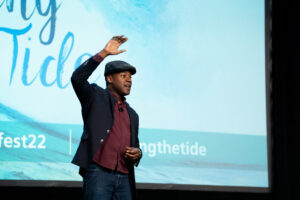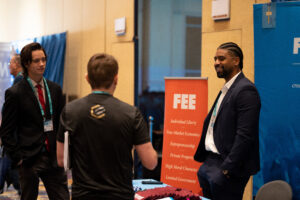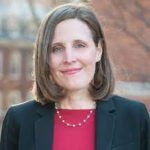With the new school year starting in August in many parts of the country, it’s an exciting time for parents, educators, and learners. American families today have more education choices than ever before, and educators have many more career opportunities to explore. From the stunning expansion of state-level school choice policies that enable education dollars to follow students rather than going to school districts, to the sustained uptick in homeschooling, and the growth of innovative learning models such as microschools, learning pods, and virtual platforms, decentralized education solutions are steadily replacing centralized systems.
This inspiring shift away from one-size-fits-all systems to more personalized solutions was on full display at this year’s FreedomFest, held at the Mirage Hotel and Casino in Las Vegas, July 13-16. Education was the sector I spotlighted during my three panel presentations, but dozens of FreedomFest sessions described the movement from top-down programs toward bottom-up possibilities in many other areas as well, including healthcare, finance and investing, entertainment, journalism and media, politics, and public policy.
While the dominant cultural narrative may be one of threat and division, FreedomFest helped to augment stories of optimism and voluntary collaboration.
In education, that optimism and collaboration are apparent in the activation and growth of microschools, parent-led learning pods, homeschooling programs, and virtual learning models that provide more parents with a diverse assortment of low-cost education options beyond their child’s assigned district school. As part of FreedomFest’s “Subversion Summit” panel on education entrepreneurship, moderated by entrepreneur and educator Michael Strong, I gave examples of the education entrepreneurs I have interviewed on my LiberatED podcast—many of whom are parents and teachers looking to solve a problem for their own family or local community. These entrepreneurs are imagining and building new prototypes for teaching and learning that are transforming education in profound ways.
 But even within the government-run school system, there are signs of hope, as school-based programs like those offered by the Foundation for Economic Education’s T.K. Coleman remind young people that their individual creativity, passion, agency, and entrepreneurial spirit can change the world. In our FEE education panel at FreedomFest, From Homeschooling to Government Schooling: Reclaiming the Full Spectrum of Education, T.K. talked about helping teenagers all across the country recognize that their youthful qualities, such as boldness and exuberance, are enormous assets for their own personal and professional development, as well as for the communities in which they live.
But even within the government-run school system, there are signs of hope, as school-based programs like those offered by the Foundation for Economic Education’s T.K. Coleman remind young people that their individual creativity, passion, agency, and entrepreneurial spirit can change the world. In our FEE education panel at FreedomFest, From Homeschooling to Government Schooling: Reclaiming the Full Spectrum of Education, T.K. talked about helping teenagers all across the country recognize that their youthful qualities, such as boldness and exuberance, are enormous assets for their own personal and professional development, as well as for the communities in which they live.
 FEE’s Director of External Relations, Marianna Davidovich, talked about the thousands of high school-age students FEE has been able to reach with programs like T.K.’s that explain the economic principles of a free society in a compelling, compassionate, and creative way. She also explained FEE’s outreach efforts to educators, including the launch of the new, online Educator Resource Center.
FEE’s Director of External Relations, Marianna Davidovich, talked about the thousands of high school-age students FEE has been able to reach with programs like T.K.’s that explain the economic principles of a free society in a compelling, compassionate, and creative way. She also explained FEE’s outreach efforts to educators, including the launch of the new, online Educator Resource Center.
On the same panel, FEE President Zilvinas Silenas shared hopeful statistics suggesting that today’s young people are actually more enthusiastic about capitalism, free markets, and entrepreneurship than we may otherwise think, and that Americans in general widely embrace capitalism over socialism. Indeed, negative attitudes toward capitalism spring from the rejection of cronyism and government favor, rather than toward capitalism itself.
Immediately following our FEE panel discussion, I headed to the main stage to participate in a FreedomFest discussion about school choice. Moderated by prominent school choice advocate Corey DeAngelis, the panel offered a panoply of opinions. From presenters who believe that there should be no government funding of education, including school choice programs, to those who cite the perceived progressive political bias in government schools as the main reason to exit them, the panel reflected a broad spectrum of perspectives.
I emphasized that school choice policies are a way to reduce the size and scope of government in the education sector while expanding options for families. I also pointed out that in a vibrant education marketplace, that relies less on government control and more on consumer choice, there will be fewer public schooling battles and a greater variety of learning options, from politically progressive education choices to conservative choices, and everything in between.
 As a new academic year is about to begin, we can dwell on points of conflict and division within our culture and communities, or we can make a different choice. We can recognize this unprecedented moment of innovation and entrepreneurship in education, and marvel at the abundance of learning options and new learning models that are emerging and expanding. We can seek out new educational opportunities for our children that align with our values and needs, and design what we can’t find. We can collaborate with others in both local and digital communities to catalyze a decentralized, parent-driven, educator-enabled entrepreneurial ecosystem in education.
As a new academic year is about to begin, we can dwell on points of conflict and division within our culture and communities, or we can make a different choice. We can recognize this unprecedented moment of innovation and entrepreneurship in education, and marvel at the abundance of learning options and new learning models that are emerging and expanding. We can seek out new educational opportunities for our children that align with our values and needs, and design what we can’t find. We can collaborate with others in both local and digital communities to catalyze a decentralized, parent-driven, educator-enabled entrepreneurial ecosystem in education.
Each year, FreedomFest brings thousands of people together to inspire optimism and foster collaboration in the quest toward maximizing individual liberty. Now it is time to turn that optimism and collaboration into action in our own communities and build a better future for our children.
 Kerry McDonald is a senior education fellow at FEE, host of the weekly LiberatED podcast, and author of Unschooled: Raising Curious, Well-Educated Children Outside the Conventional Classroom (Chicago Review Press, 2019). Follow her writing here, and sign up here for FEE’s weekly email newsletter.
Kerry McDonald is a senior education fellow at FEE, host of the weekly LiberatED podcast, and author of Unschooled: Raising Curious, Well-Educated Children Outside the Conventional Classroom (Chicago Review Press, 2019). Follow her writing here, and sign up here for FEE’s weekly email newsletter.

